FloForm: Industry Leader with 14 North America Locations
by Peter J. Marcucci
Photos Courtesy FloForm and Lauren Butler
Our featured stone shop this month is a once in a blue moon opportunity to feature a company that’s built to huge proportions through vision, ambition and motivation. FloForm is one of those companies, and as you’ll see, it is dynamism at its best, but not without a mixture of fortitude and ethics.
The original FloForm, located in Winnipeg, Manitoba Canada, was founded in 1961 by three brothers. The company manufactured post-formed laminate countertops (Plastic laminate sheets are bound to a particle board substrate using heat and pressure). Supplying this style of countertops, to a sparsely populated market throughout the Canadian prairie within the Alberta, Saskatchewan and Manitoba provinces, the company flourished for decades. That is, until the late 1980s, when unannounced to the brothers the glue manufacturer switched the components used in the glue from natural rubber to more environmentally friendly synthetic rubber. However, over time, this glue would prematurely break down and release curved areas of laminate that retained tension, such as rolled edges and backsplashes, basically de-laminating the countertop.
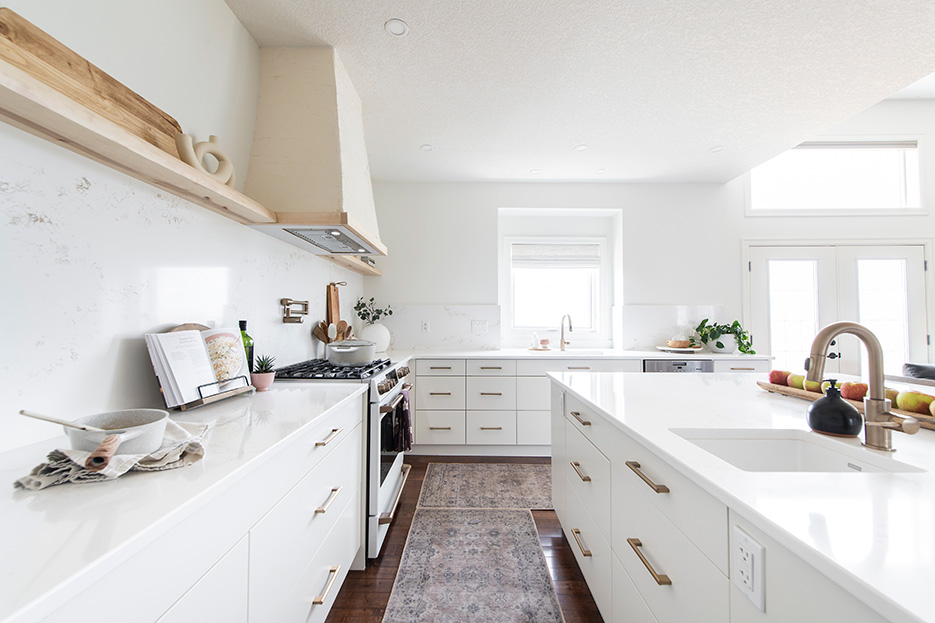 |
|
FloForm classic white residential kitchen designed with Hanstone Strato. |
One Man’s Problem = Another Man’s Opportunity
The brothers, now overwhelmed with warranty issues, did make a valiant effort to correct the situation, but were now teetering on bankruptcy, recalled Ted Sherritt. “The company’s service techs, between the late ‘80s and early ‘90s, knocked on 30,000 doors to repair or replace these countertops. That’s a large number, and quite often it was to the same residence to glue a different section that didn’t fail as quickly as the others in the house.”
During this time, Sherritt, a Certified CPA and Chartered Business Valuator, worked for KPMG, and was hired by FloForm to provide financial projections that were used to keep the company from going bankrupt. This huge liability knocked off a significant amount of value from the company’s net worth due to significant warranty costs and growing debt.
Now in a downward spiral facing certain crash and burn, Sherritt took a chance, he explained. “They were told to go bankrupt many times, but they weren’t going to do that. They were honest businessmen who sold the product, and would keep working until the customer was happy. The reputation and longevity of this company is because of their commitment to the customer, and to this day is our guiding principal. I then said, ‘If you guys need money and a CFO, I should buy a part of your business and come work for you.’ So, my wife, Marnie, and I invested money in 1995. As for the two brothers who were still there, one retired in 1997, the other in 2000, when I then became the President and CEO.”
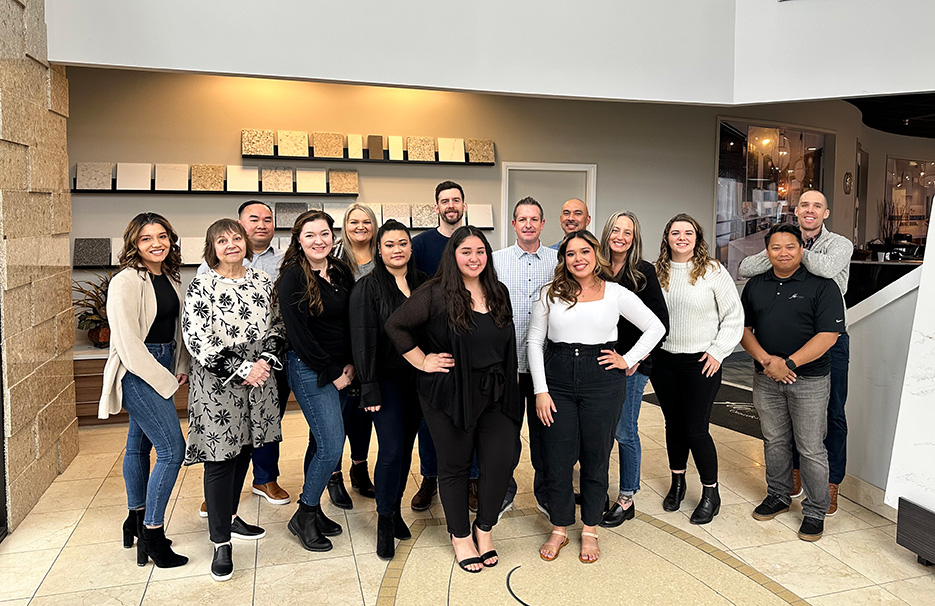 |
|
Above: FloForm Kent, Washington branch staff in the Kent showroom.
Below: The FloForm network of shops is spread across 14 North America locations, and growing. |
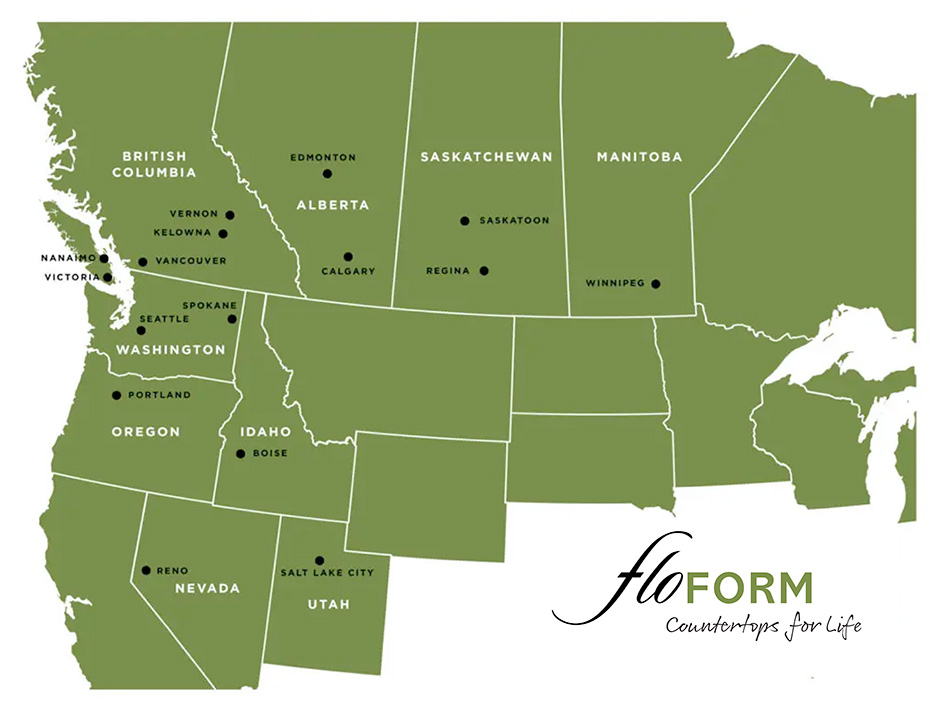 |
|
Below, Left: FloForm concentrates its fabrication in 4 U.S. and 3 Canadian facilities. FloForm primarily uses Park Industries machines, with over 50 Park CNCs, Sawjets, edgers, and bridge saws in operation, in addition to water recycling systems. All FloForm shops are wet fabrication.
|
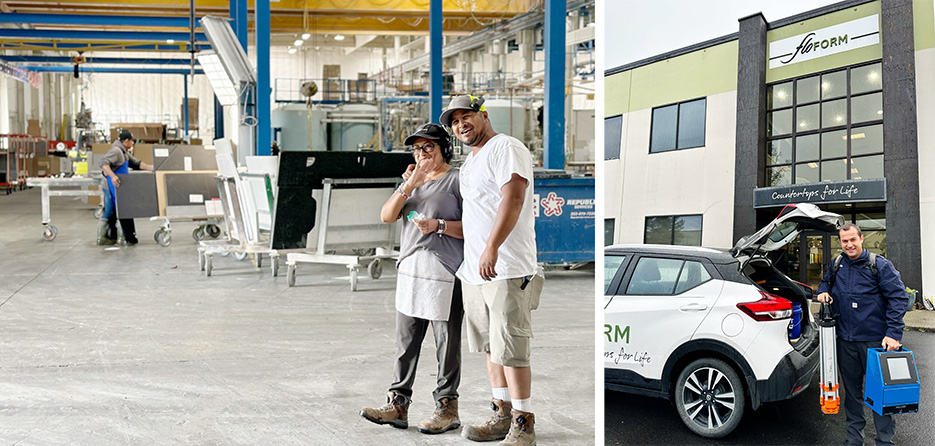 |
Mergers and Acquisitions
Sherritt, now having skin in the game, had a lot to lose, and continued to work to get the company profitable again, creating a strong foundation to build on. It was now time to grow, he realized. “In 2003, we started selling natural and engineered stone, and put a factory in Saskatoon, which was in the center of our market. Then, in spring of 2008, we bought Fine Line Pacific, which had locations in Spokane and Seattle, Washington and Portland, Oregon. We used this high-capacity manufacturing center in Kent (Seattle) to feed the Vancouver and British Columbia markets.”
According to Sherritt, of all the company’s 14 current locations, the original location in Winnipeg continues to be the most successful due to its history of service.
FloForm’s fabrication is done in 4 shops in the U.S. and 3 shops in Canada. All are fully wet and outfitted with Park Industries machines, period! Sherritt started with Park machinery, and believes FloForm is one their biggest customers. He has over 50 machines consisting of CNCs, sawjets, edgers, bridge saws and water recycling systems. Sherritt also knows all too well, that a machine has only just so many hours in it, and doesn’t hesitate to upgrade to more efficient Park Industries equipment when needed.
The company employs over 800 team members. A staggering amount by any measure, but all are needed and valued, he explained. “Everybody says their employees are their biggest asset, and that is true. They are respected, they have a safe place to work, and we try to live by our core values every day. We challenge them, reward them, and appreciate them for what they do regardless if they are at the executive level or working on the shop floor.”
Sherritt is a longtime member of the esteemed Artisan Group. For those not in the know, the Artisan Group is an assembly of fabrication company owners from specific locations around the country, who come together to share best practices, knowledge and help solve problems. Additionally, Sherritt is a member of the Rockheads, as well as the International Surface Fabricators Association (ISFA), where he was recently made president. When asked why he is very involved with these groups, Sherritt said, “I have learned way more from those guys than they have learned from me, I’ll tell you that right now. The networking opportunity is by far the largest benefit from these associations. How you work with Home Depot, how you can sell upgrades consistently, tooling set-ups or a fabrication trick! You can learn so much. We trust each other, we like each other, and I’ll tell anybody any of my secrets, because I know they’ll use it to better their business, and they will tell me theirs.”
When asked about his recent ISFA presidency, Sherritt said, “I started with ISFA in the late 90s, and spent two three-year terms as treasurer, back in the day. Then, when they said I should run for president, I said, “I can’t, because I cannot make a countertop. The president of ISFA should not be a guy who cannot make a countertop.’ I’ve seen so many guys who started in their garage with a table saw and a router, and I’ve always felt that it’s those people who should be president of ISFA.
“But these days, there are so many issues going around in stone fabrication, I finally did agree, and don’t think that hands-on fabrication experience is as important for leadership today, as I did back then.”
According to Sherritt, one big issue these days is silica in the workplace, and how shops that are dry cutting and grinding are giving OSHA-compliant wet shops a bad name. Sherritt has taken on this problem by leveraging his ISFA and NSI experience as well as his long-time associations within the industry. No one knows the saying, “There’s Power In Numbers” better than Sherritt, and he’s gearing up lead the ISFA in support of the stone fabrication community, as well as hold the media accountable for presenting the facts around silica accurately. (We will present more on the topic of Silica Safety Education in the May Slippery Rock Gazette.)
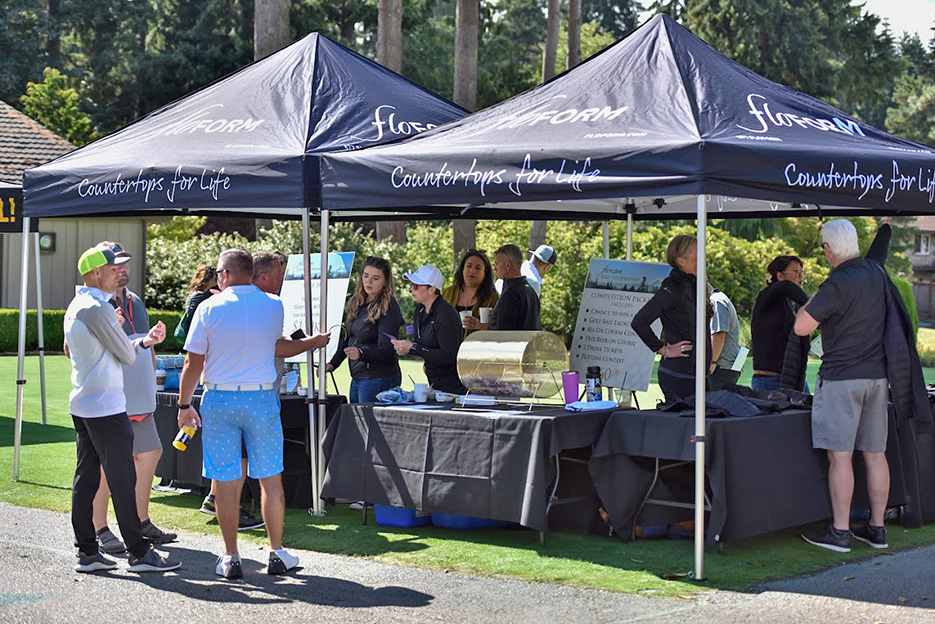 |
|
Above: FloForm annual charity golf tournament benefits the Autism Society.
Below: FloForm Kent branch install teams. |
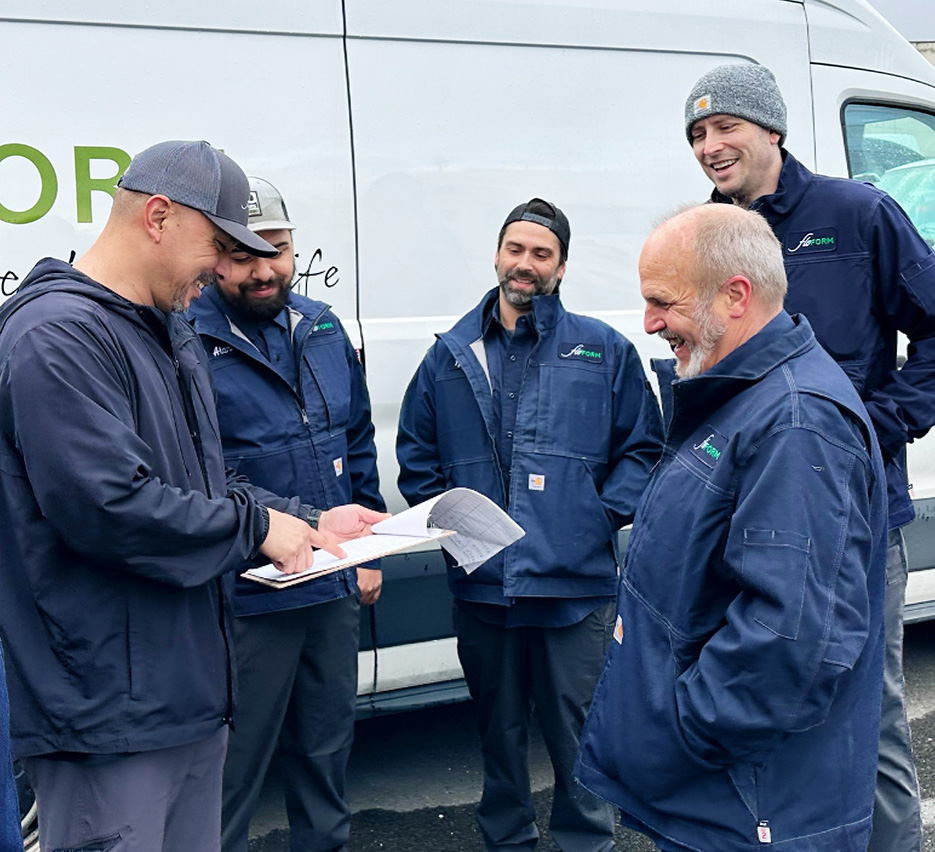 |
|
TBelow: ed Sherritt (left) ) alongside fellow FloForm employees at the FLoForm Annual Golf Tournament. |
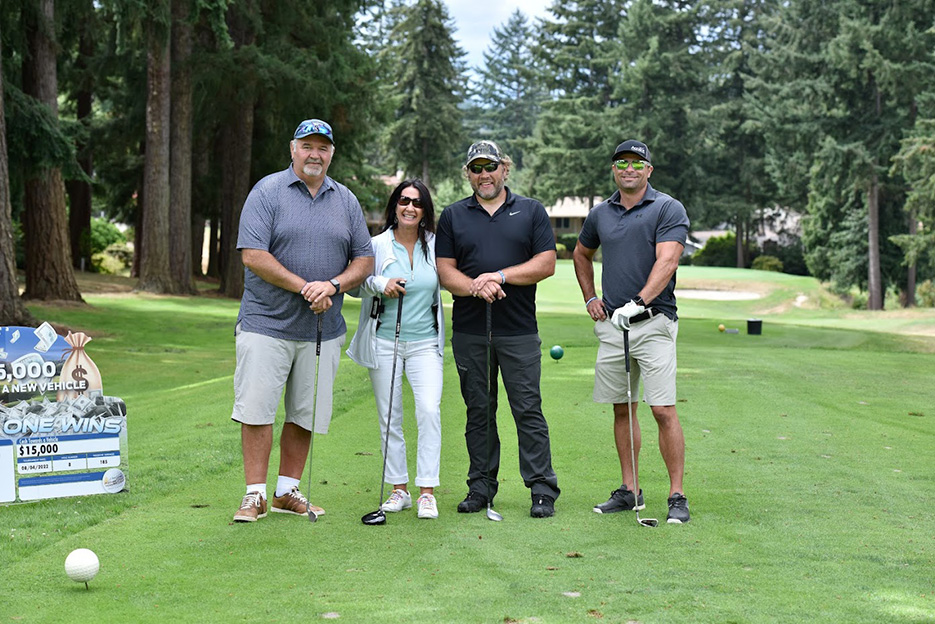 |
|
Below: Dekton Trillium provides a visual contrast in this under-bar space installed in the Kent, Washington showroom. |
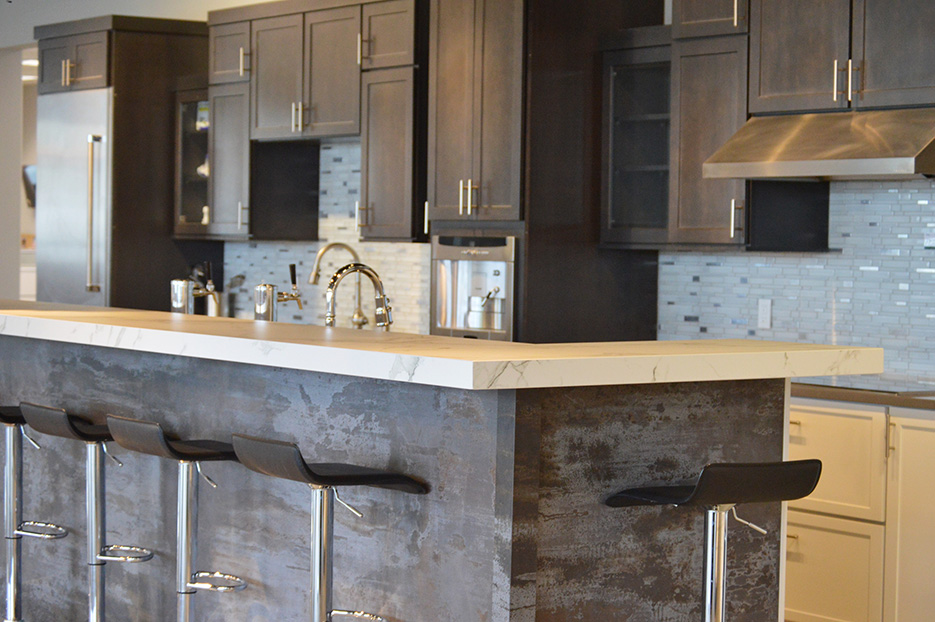 |
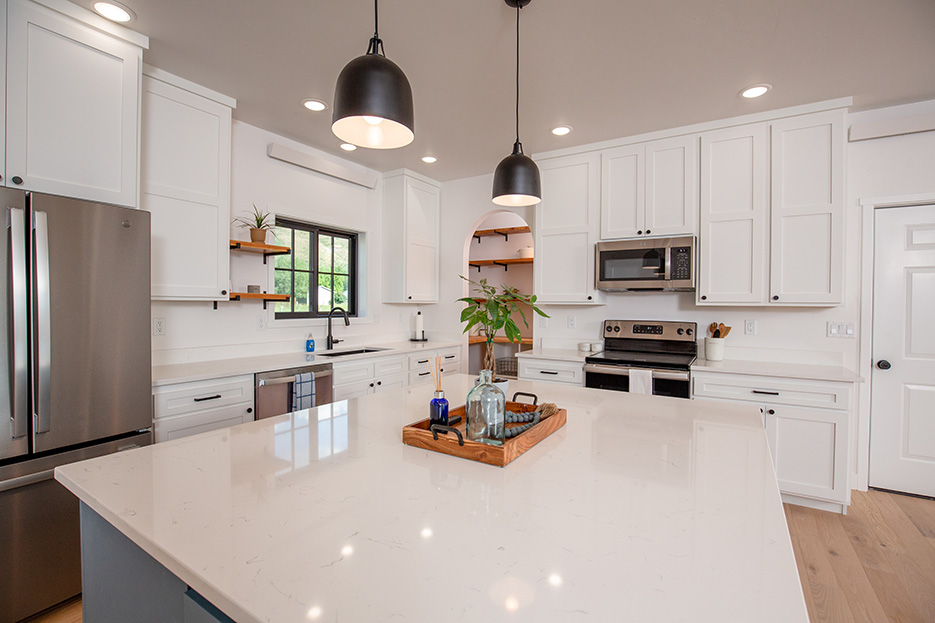 |
The Difference is in the Service
FloForm’s many markets have changed so abruptly from solid surface and post-formed since 2000, that hard surfaces such as granite, porcelain and engineered stone are currently 85% of the company’s sales, by dollars spent. “We were just plastic laminate back in the day, and then solid surface until the market for Corian got replaced by hard surfaces. But today, engineered stone is 60% of our market and the dominant product. It is, in my opinion, the perfect countertop material, and if we weren’t selling hard surface products, we wouldn’t be here today.”
About 80% of their work is residential, while serving builders, big box stores and kitchen and bath dealers. Commercial also plays a large part in the company’s very diversified customer base, markets and materials. They sell sinks and faucets, but no cabinets due to avoiding any conflict with kitchen and bath dealers. According to Sherritt, FloForm buys mostly its surface materials from local distributors, due to the distant span of its seven locations, which covers all of western Canada and a huge swath of the Pacific Northwest and mountain West regions in the USA. This expansive business model is also one of the company’s biggest advantages.
“Our geographic footprint is a huge asset. We cover Costco, Home Depot, Rona and Lowe’s in these regions, and offer a diverse selection of materials. Another is the full service we offer. We do countertop and plumbing removal and then install, including the sink, which we get in quantity from BB Industries, and backsplash and follow-
up warranty services. So we’re really a one stop-shop for the retail homeowner in a remodel. That’s why our Costco customers love us, because we come to their house on Tuesday morning, and by Tuesday night they have a brand-new-looking kitchen. Those are our three unique differences from other fabricators.”
Closing Words
There is no doubt that FloForm will continue to grow; mergers and acquisitions are in Sherritt’s DNA. “I’m a Chartered Business Valuator, and we know what cash flow looks like, we understand ratios and working capital. There are lots of people who are great fabricators, but don’t have that kind of business acumen. We don’t take advantage, but do understand how we can buy something and add value and make it worth more quickly.”
For more information, please visit www.floform.com.